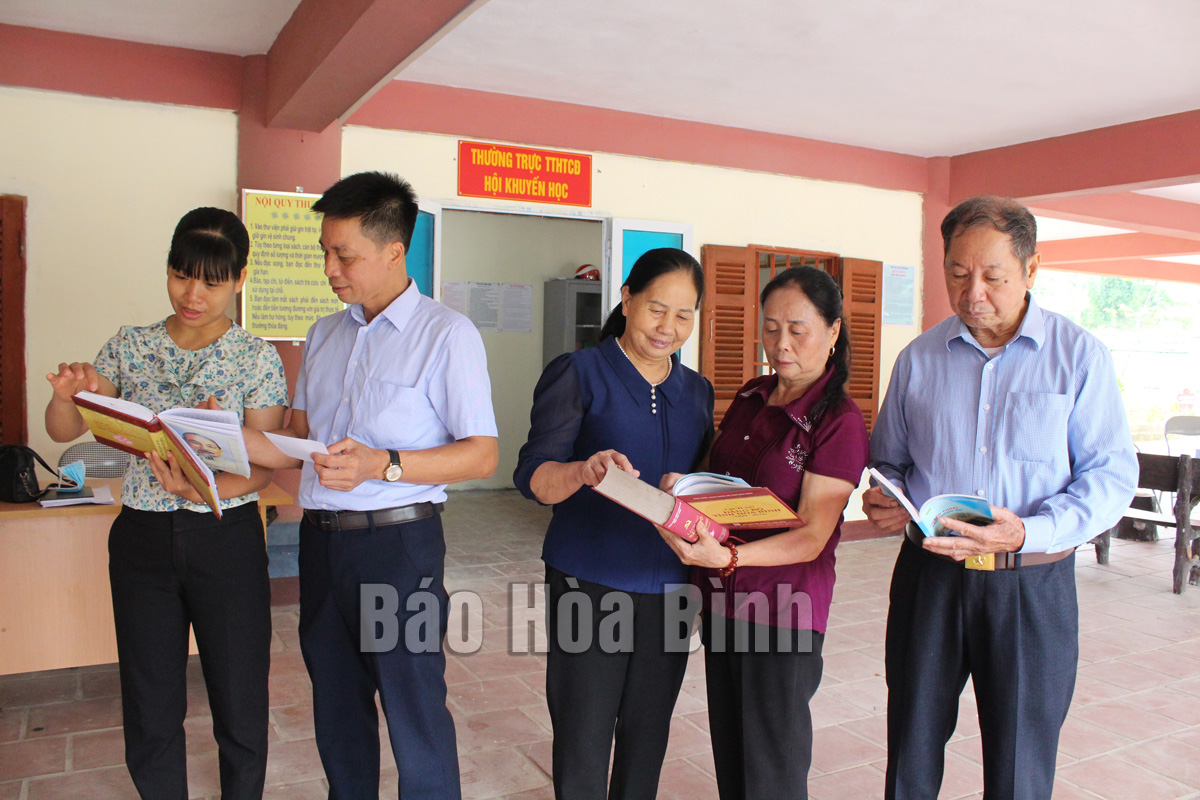



The people access the materials at the Community Learning Center of Thu Phong Commune (Cao Phong), contributing to improving people's intellectual level.
Bac Phong commune has completed the target of meeting the standards of new rural areas by the end of 2021 according to the set plan. To achieve the goal, the commune has synchronously implemented the solutions, focusing on creating jobs for rural employees and improving the income and living standards of the local people.
Mr. Bui Xuan Thiet, the Vice Chairman of the Commune People's Committee, the Director of the Bac Phong Commune’s CLC says: The process of building a new rural area has been implemented with the synchronous participation of the Party Committee, the government, and socio-political organizations and the whole people, in which, the center of CLC has effectively been contributing to the implementation of the general plan of the whole commune. First of all, the center has advised the leaders of the Party Committee, the People's Council, and the Communal People's Committee, and it has been coordinating with the relevant departments and agencies to issue the leadership plans, directing and organizing the implementation of the key tasks. In particular, the role of "The People's School” has been well promoting. The center has presided over the investigation and collection of data to summarize the learning needs of the people in the commune. Thereby, the special classes have been opned for the employees at the centers and the cultural houses of villages, implementating the education of life skills for employees and a part of students at schools. The classes have been organized based on the needs of the employees, so the effectiveness of studying at the center is highly appreciated. After having studied, many employees have found stable jobs, helping to improve their incomes.
In Bac Phong commune, there are 100% of the households engaged in agriculture, mainly growing sugarcane, citrus fruits such as oranges, tangerines, pomelos and raising cattle and poultry. Although agricultural production is a traditional profession, the actual economic efficiency is not high, many households have difficulty in applying agricultural knowledge to production. Therefore, the communal CLC has connected with the district’s Vocational Education and Continuing Training Center to open classes, which are suitable to the practical needs such as the classes on the techniques for raising buffaloes, cows, chickens, the industrial sewing classes... Besides, the center has also been focusing on organizing the thematic classes divided into each field on: law, economic development, health protection, environmental protection... Currently, the center maintains 10 clubs for the community development of 10 hamlets. They include the club "model hamlet, model family”; the flower-loving club, the model "collecting scrap to raise funds and protect the environment”...
On the whole district, 10 CLCs of 10 communes and town have stablt been operating with good efficiency so far. In which, 5 out of the 10 centers have their own headquarters; 100% of the centers have their own accounts, computers connected to the internet, community bookcases and audio equipment for the activities. According to Cao Phong District’s Division of Education and Training, there are currently 40 people working part-time and full-time at 10 CLCs, 100% of whom have college degrees or higher. In general, CLCs have well been promoting their roles, actively implementing the activities in accordance with reality, contributing to creating jobs and raising incomes for the local people. In the whole district, there are 105 clubs for the community development with 630 member groups, 135 teachers, guides and collaborators participating in teaching and guiding the topics and the activities at the CLCs.
Ms. Kieu Thi Hong Thuy, the Deputy Head of Cao Phong District’s Division of Education and Training affirms: In an effort to improve the operational efficiency, CLCs always focus on well performing the task of investigating, organizing classes and topics, which are suitable to the needs of the actual needs of each locality and participants. At the same time, it is necessary to strengthen the organization of classes to increase the percentage of people equipped with the information capacity and life skills, consolidating the results of building learning models with 100% of communes and towns being recognized the title of the Communal Learning Community… These are the positive results, effectively contributing to the socio-economic development of the district, towards the goal that Cao Phong will reach the standard of the new rural district by 2025.